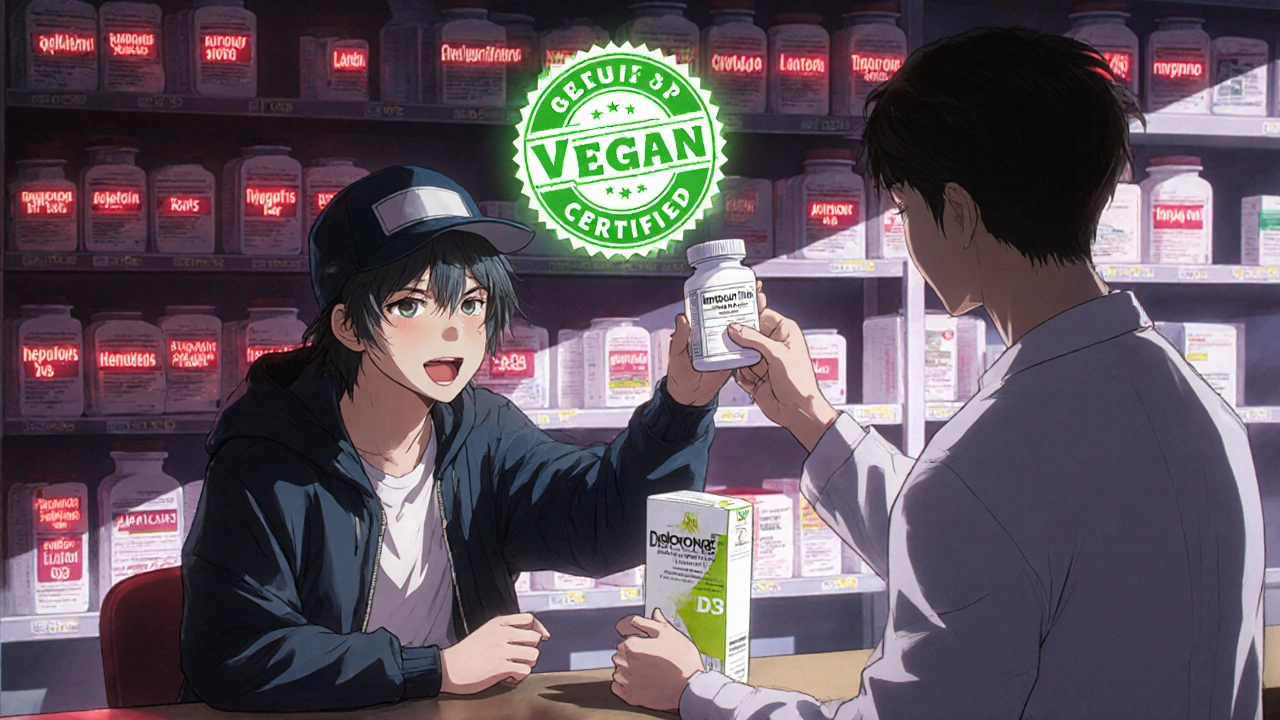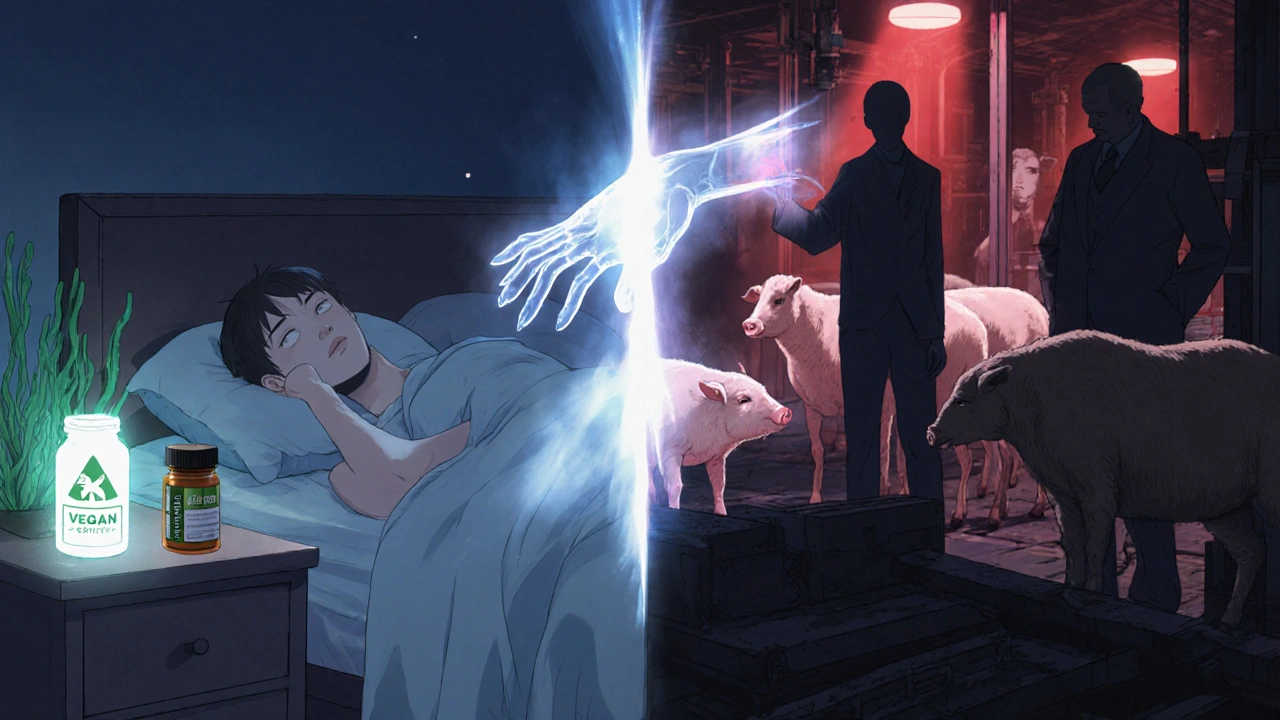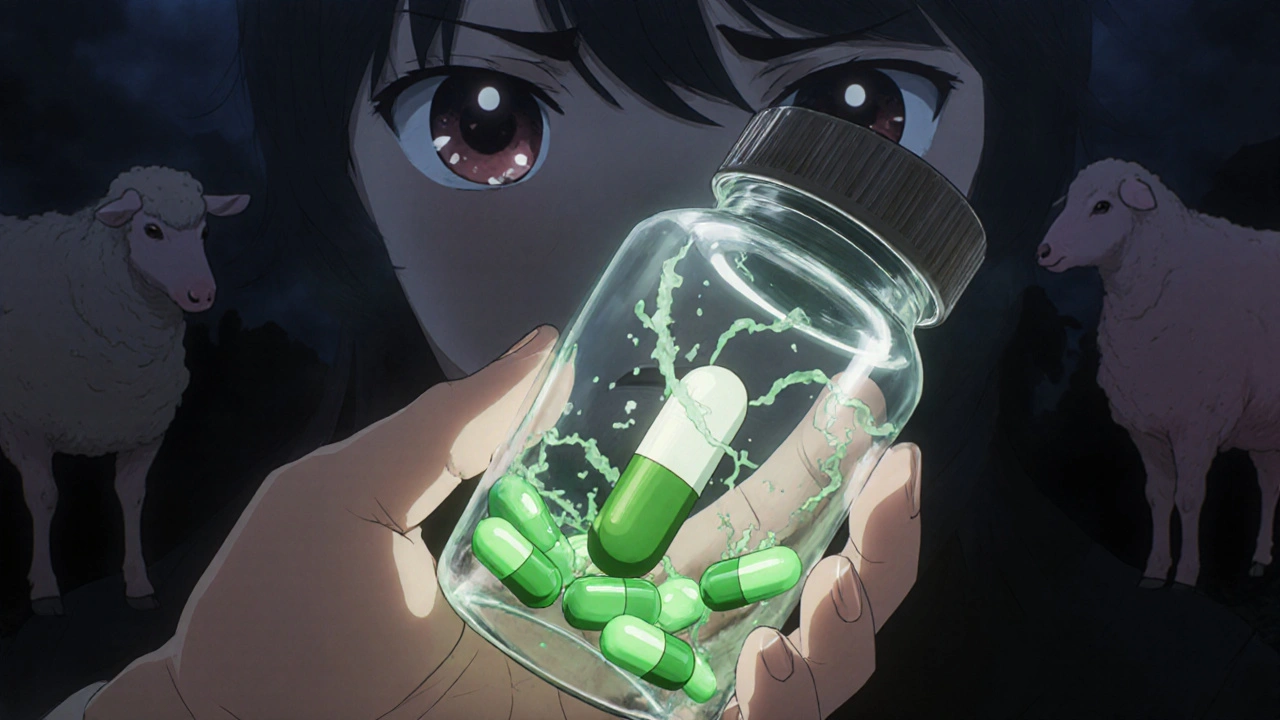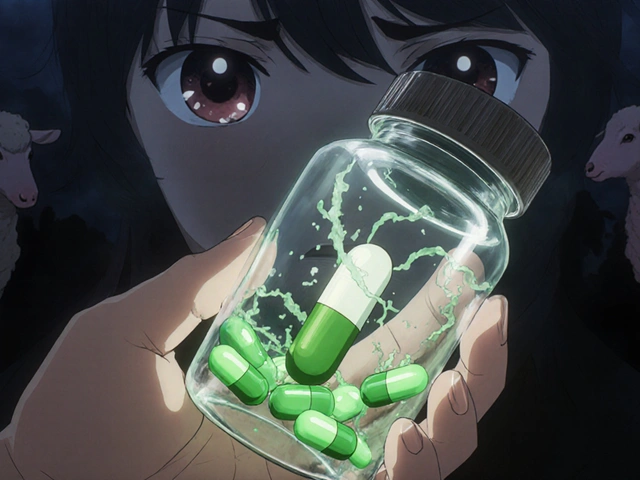Most people assume that if a pill is prescribed by a doctor or sold as a supplement, it’s safe - and neutral. But for vegans and vegetarians, that assumption can be dangerously wrong. Hidden animal ingredients are everywhere in medications, and most consumers have no idea they’re swallowing pig fat, sheep wool, or horse urine. You might think you’re eating clean, living ethically, and avoiding animal products - but your medicine could be breaking every rule you live by.
What’s Really in Your Pills?
It’s not just supplements. It’s prescription drugs, over-the-counter pain relievers, even antibiotics. The most common animal-derived ingredient? Gelatin. Around 90% of capsules - the little shells that hold your medicine - are made from gelatin, which comes from boiling down the bones, skin, and tendons of pigs, cows, and chickens. If you’re taking a capsule, odds are it’s animal-based unless it’s specifically labeled otherwise. Then there’s magnesium stearate, a common flow agent used to keep pills from sticking together during manufacturing. About 65% of the time, it’s made from animal fat. You won’t find it listed as “pig fat” on the label. It’s just listed as “magnesium stearate.” Same with stearic acid (E570), another lubricant. The Viva Organization confirms it’s often sourced from slaughtered cows, sheep, and pigs. Vitamin D3 is another major trap. Most supplements use lanolin, which is extracted from sheep’s wool. It’s not “vegetarian-friendly” just because it’s not meat - it’s still an animal product. The plant-based alternative? Vitamin D3 derived from green algae. It’s identical in function, just not from a sheep. And yes - it’s available. You just have to ask for it.Medications That Are Surprisingly Animal-Based
Some medications aren’t just contaminated with animal byproducts - they’re made from them. These aren’t fillers. These are the active ingredients.- Premarin - a hormone therapy for menopause - is made from the urine of pregnant mares. Yes, horse pee. Synthetic alternatives exist, but they’re not identical.
- Armour Thyroid - a popular thyroid medication - comes from dried pig thyroid glands. Synthetic levothyroxine (T4) is vegan, but many patients still get prescribed Armour because it’s a combination of T3 and T4. There’s no direct vegan replacement.
- Heparin - a blood thinner - is extracted from pig intestines. No plant-based version exists yet. If you’re on this, you’re using an animal product.
- Creon and Viokace - pancreatic enzymes for digestion - are made from pig pancreas. Again, no vegan substitute.
- Vascepa - a fish oil-based heart medication - contains icosapent ethyl from anchovies and sardines.
- Propofol - an IV anesthetic - contains egg phospholipids. If you’re allergic to eggs or vegan, this matters.
These aren’t edge cases. These are widely prescribed drugs. And if you didn’t ask, your doctor probably didn’t tell you.
Why Don’t Labels Say This?
Food labels in most countries must list allergens and animal ingredients. Not medications. The FDA and other global regulators don’t require pharmaceutical companies to disclose animal-derived ingredients unless they’re allergens. That means gelatin, stearic acid, and lanolin can hide in plain sight. A 2022 report from the Transparent Label Campaign found that 50% of supplements on the U.S. market contain hidden animal byproducts. That number is likely similar for prescription drugs. And most people - even those who’ve been vegan for years - have no idea. The reason? Manufacturing. Animal-derived ingredients are cheap, effective, and already approved. Switching to plant-based alternatives requires reformulation, retesting, and regulatory approval - all expensive and slow. So the industry sticks with what works.
What Can You Do?
You don’t have to give up your ethics to get the medicine you need. But you do need to be proactive.- Ask your pharmacist - not just your doctor. Pharmacists handle the actual formulation. Ask: “Is this medication free from gelatin, magnesium stearate, lanolin, and other animal-derived ingredients?” Don’t say “I’m vegan.” Say exactly what you’re avoiding.
- Check the capsule form - if it’s a capsule, assume it’s gelatin unless it says “vegetarian capsule” or “cellulose-based.” Tablets are more likely to be vegan.
- Look for vegan-certified brands - companies like Dr. Vegan and brands listed on Pill Clarity (formerly VeganMed) verify their products are animal-free. Pill Clarity now certifies over 1,200 medications and supplements as vegan.
- Switch Vitamin D3 - if you’re taking a supplement with “D3,” check the source. If it says “lanolin” or “cholecalciferol from sheep’s wool,” ask for the algae-based version. It’s just as effective.
- Use the PETA list - PETA maintains a publicly available list of animal-derived ingredients in medicines. Bookmark it. Know what to look for.
Some people think, “If it’s a life-saving drug, I’ll take it anyway.” That’s understandable. But you still have options. For example, if you need thyroid medication, you can ask for levothyroxine instead of Armour Thyroid. It’s synthetic, vegan, and just as effective for most people. If you need heparin, there’s no vegan alternative - but you can ask for the lowest possible dose and discuss long-term alternatives with your doctor.
What About Alternatives?
There’s good news: plant-based alternatives exist for most inactive ingredients. Gelatin capsules? Replace them with hydroxypropyl methylcellulose (HPMC) capsules - made from plant fiber. Magnesium stearate? Can be sourced from palm oil or coconut. Glycerin? Can come from vegetable oil instead of animal fat. The problem isn’t lack of science. It’s lack of demand - and lack of labeling. Pharmaceutical companies won’t change unless enough people ask. And that’s where you come in.
When There’s No Vegan Option
Some medications simply don’t have vegan alternatives. Heparin, pancrelipase, propofol - these are still animal-derived because no synthetic version has been approved or proven as effective. In these cases, you’re left with a hard choice. Some vegans choose to take these medications anyway, reasoning that their health comes first. Others seek out compounding pharmacies, which can sometimes create custom formulations without animal ingredients - though this is expensive and not always covered by insurance. The key is awareness. If you know ahead of time that your medication contains animal products, you can plan. Talk to your doctor. Ask if there’s a different drug with the same effect. Explore clinical trials. Research alternatives. Don’t just accept what’s handed to you.Where to Find Reliable Information
You don’t have to guess. There are trusted resources:- Pill Clarity - the rebranded version of VeganMed - offers a searchable database of animal-free medications. You can search by drug name and see if it’s verified vegan.
- Dr. Vegan - offers a line of vegan supplements, including algae-based D3, and provides detailed ingredient breakdowns.
- The Transparent Label Campaign - publishes reports and guides on hidden animal ingredients. Their 2022 findings are still the most comprehensive source.
- PETA’s Animal-Derived Ingredients List - a downloadable PDF that lists every chemical name to watch for.
These aren’t fringe websites. They’re backed by pharmacists, researchers, and thousands of patient stories.
Final Thoughts
Being vegan or vegetarian isn’t just about food. It’s about consistency. If you avoid leather, you avoid gelatin. If you avoid factory farming, you avoid medications made from pig organs or horse urine. It’s not about perfection - it’s about intention. You have the right to know what’s in your medicine. You have the right to ask. You have the right to seek alternatives. And you’re not alone. Thousands of people are doing the same thing - calling pharmacies, writing to manufacturers, demanding transparency. The system isn’t built for you. But you can still change it - one pill at a time.Are all capsules made from animal gelatin?
No. While about 90% of capsules use gelatin from pigs, cows, or chickens, many brands now offer vegetarian capsules made from hydroxypropyl methylcellulose (HPMC), a plant-based fiber. Look for labels that say "vegetarian capsule" or "vegan capsule." If it doesn’t say, assume it’s animal-based.
Is Vitamin D3 always from animals?
Most Vitamin D3 supplements use lanolin from sheep’s wool, making them non-vegan. But plant-based D3 from green algae is widely available and just as effective. Brands like Dr. Vegan and Nordic Naturals offer algae-derived D3. Always check the source - it should be listed on the label.
Can I get vegan alternatives for thyroid medication?
Yes, but not for all types. Armour Thyroid is made from pig thyroid glands and has no direct vegan substitute. However, synthetic levothyroxine (T4), sold under brands like Synthroid or Levoxyl, is vegan and works for most people. Talk to your doctor about switching if you’re on Armour Thyroid.
Why don’t drug labels list animal ingredients?
Regulatory agencies like the FDA don’t require pharmaceutical companies to disclose animal-derived ingredients unless they’re allergens. Gelatin, stearic acid, and lanolin are considered "inactive" ingredients, so they don’t need to be labeled. This creates a transparency gap that consumers must navigate themselves.
Is there a vegan alternative to heparin?
No, there is currently no FDA-approved vegan alternative to heparin, which is extracted from pig intestines. It’s a critical anticoagulant, and plant-based substitutes have not yet met the required safety and efficacy standards. If you need heparin, there’s no ethical workaround - but you can discuss long-term alternatives like warfarin or direct oral anticoagulants (DOACs) with your doctor.
How do I find a vegan-friendly pharmacist?
Start by calling local pharmacies and asking if they can check for animal-derived ingredients in prescriptions. Many pharmacists now use Pill Clarity’s database to verify medications. You can also search for compounding pharmacies - they can often create custom formulations without gelatin, stearic acid, or lanolin. Don’t be afraid to ask for help - this is a growing need.








Comments
Wow. I had no idea gelatin was in 90% of capsules. I’ve been vegan for 8 years and thought my meds were fine because they weren’t ‘meat.’ Turns out I’ve been swallowing pig skin like it’s candy. Time to call my pharmacist tomorrow. Thanks for laying this out so clearly.
so like… if i take heparin im a bad vegan? wow. how dare i live. also i hate when people act like their diet is a moral crusade. get a life.
Man, this hit different. I’m from India, and we’ve got a ton of Ayurvedic and herbal meds here - but even then, some of the capsules are gelatin-based. I once asked a pharmacist why and he just shrugged. No one thinks about this until it’s too late. I’m switching my D3 to algae-based today. Also, props to Pill Clarity - I just bookmarked it.
It’s not about being perfect. It’s about being aware. I used to feel guilty when I found out my blood pressure med had gelatin - like I’d failed my values. But then I realized: ethics isn’t about purity, it’s about intention. I switched to a tablet form, asked for vegan stearate, and now I’m not just surviving my condition - I’m living it with integrity. You don’t have to choose between health and conscience. You just have to ask the right questions.
I cried reading this. Not because I’m dramatic (okay maybe a little) but because I’ve been on Armour Thyroid for 5 years and never knew it was pig thyroid. My mom’s a vegan too. I just told her. She’s gonna call my endo tomorrow. Thank you for making me feel less alone in this.
so like… vitamin d3 from sheep wool?? why not just call it sheep juice? and why do companies make it so hard to find the vegan version? i googled for 20 mins last week and gave up. now i just take the regular one and pretend i dont care. (i do care. i just hate bureaucracy.)
Transparency in pharmaceutical labeling is a public health imperative. The absence of mandatory disclosure of animal-derived excipients constitutes a systemic failure in informed consent.
You’re not alone in this. I used to feel weird asking for vegan meds - like I was being difficult. But now I just say, ‘Can you confirm this is free from gelatin, lanolin, and stearic acid from animal sources?’ And guess what? Pharmacists are usually super helpful. One even printed me a list of vegan alternatives. You’ve got this.
why are we even talking about this? just take the pill. its medicine. you dont have to be a hero.
you people are ridiculous. you’re mad because your ideology conflicts with basic biology. pigs are food. sheep are wool. you’re not special for avoiding them. you’re just a self-righteous hypocrite who thinks your diet makes you morally superior. get over it.
I remember when I first learned about lanolin in vitamin D3 - I was in a pharmacy in Portland, holding a bottle of Nature Made, and I just stood there for five minutes staring at the label like it was a poem. I didn’t know what ‘cholecalciferol’ meant, but I knew it came from sheep. And then I thought - what else have I been swallowing without knowing? I started digging. I found Pill Clarity. I started emailing manufacturers. I joined a vegan-med support group on Facebook. And now, I’m not just taking pills - I’m participating in a quiet revolution. It’s not glamorous. It’s not viral. But it’s real. And if you’re reading this and you’re asking these questions? You’re already part of it.
if you need heparin dont stress. its life saving. you can still be vegan in other ways. i take vegan supplements and avoid leather but i took heparin after my c-section. its fine. dont let guilt mess with your health
The pharmacokinetic profile of animal-derived excipients remains a critical gap in pharmacovigilance frameworks. The absence of mandatory disclosure protocols for non-allergenic excipients like stearic acid and gelatin undermines the principle of patient autonomy in therapeutic decision-making. This is not merely an ethical concern - it is a regulatory deficiency.
Interesting. I’m from the UK, and here we’ve got the NHS - they’re slowly catching on. My GP actually referred me to a specialist pharmacist who checked my meds for animal content. It took three weeks, but they found a vegan alternative for my statin. Not everyone has access to that. This needs to be standard. Not a luxury.
Why do companies use animal ingredients? Because they’re cheap, and no one asks. I wrote to three big pharma companies last year. Two didn’t reply. One said, ‘We’re exploring alternatives.’ That’s not good enough. We need to demand change - not just switch pills. If you’re reading this, write an email. Call your senator. Make noise. This isn’t about being perfect - it’s about being loud enough that they can’t ignore us anymore.